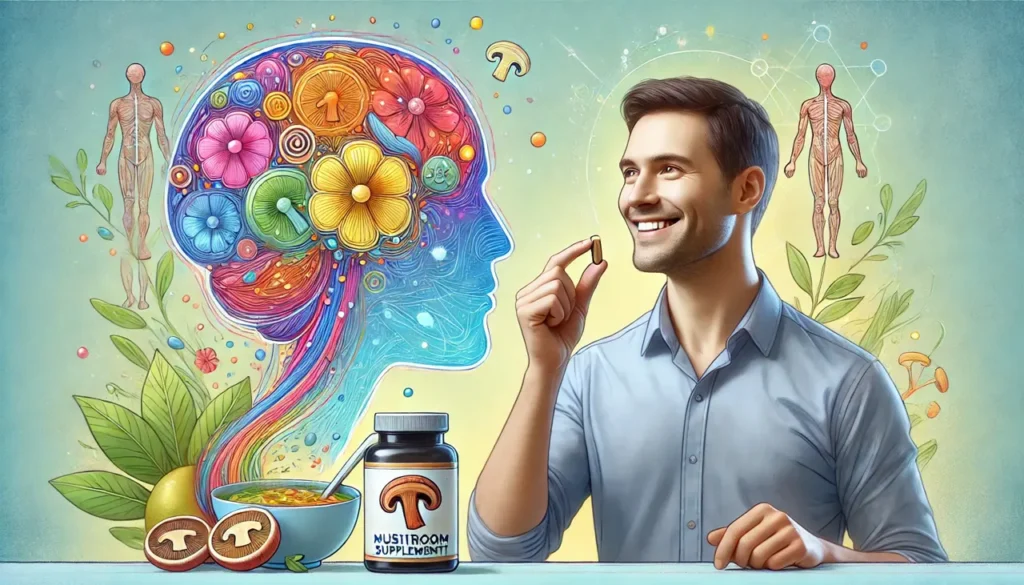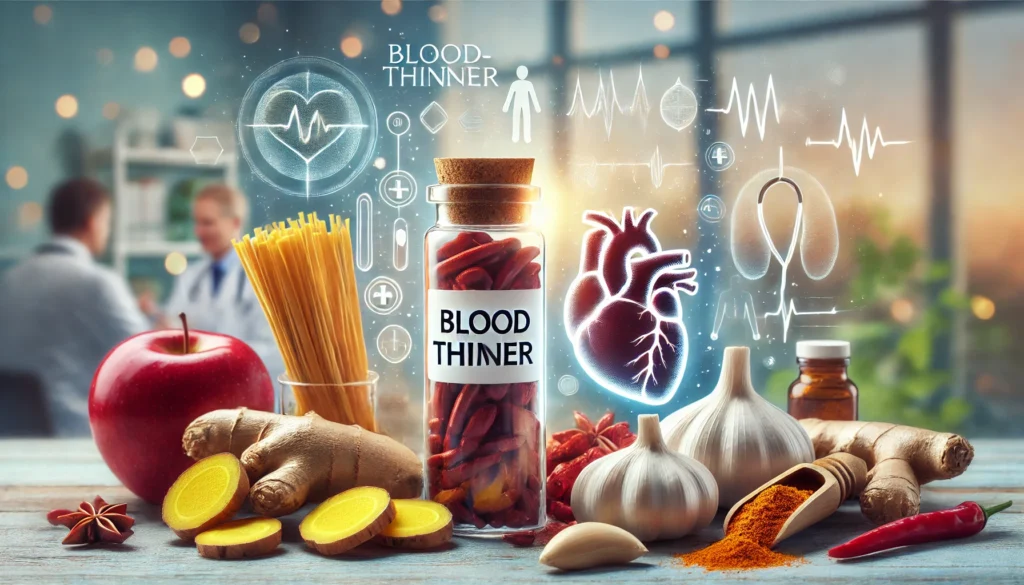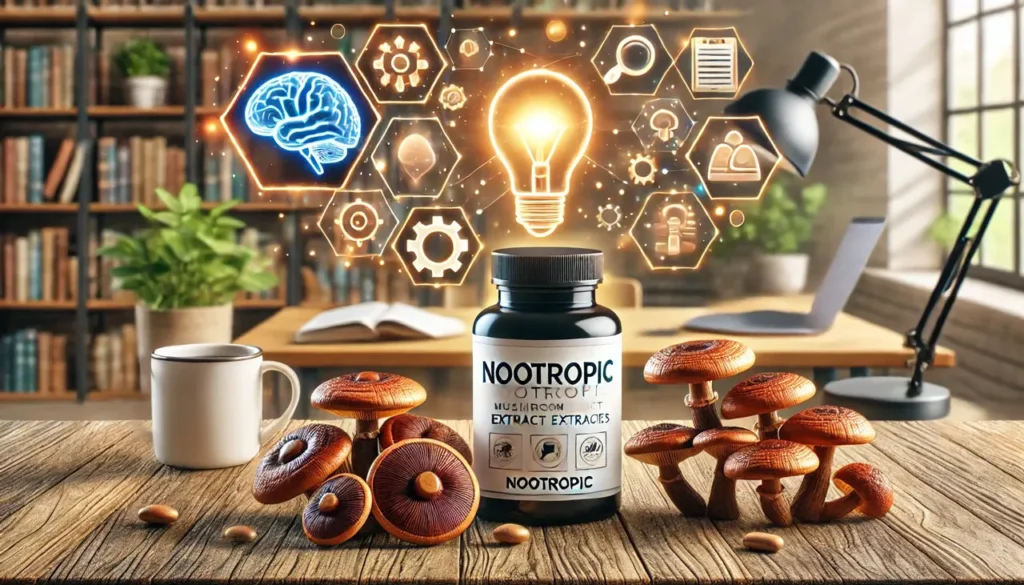The Reishi mushroom (Ganoderma lucidum), also known as Lingzhi, is a well-known medicinal mushroom that has been used in traditional Eastern medicine for thousands of years. While historically recognized for its immune-boosting and anti-inflammatory properties, Reishi has recently garnered attention for its potential nootropic effects—benefits that could enhance cognitive function, memory, and focus. As interest in natural supplements and nootropics grows, Reishi mushroom is emerging as a popular choice for those seeking to optimize mental performance. This article will explore the potential nootropic benefits of Reishi mushroom, elaborate on its key active ingredients, and discuss the appropriate dosage, side effects, interactions, and risks associated with its use, particularly in the context of brain health.
You May Also Like:
Source of Reishi Mushroom
Reishi mushroom (Ganoderma lucidum), also known as Lingzhi, is a medicinal fungus that has been used in traditional Chinese and Japanese medicine for over two millennia. It grows primarily on decaying hardwood trees in various regions of Asia, particularly in humid and warm environments. The mushroom is most commonly found in the mountainous forests of China, Korea, and Japan.
Reishi has a distinctive appearance characterized by its reddish-brown cap with a shiny, varnished surface, giving it a glossy texture. Although Reishi mushrooms can be harvested from the wild, they are now largely cultivated for medicinal use, allowing for standardized extraction and formulation processes. Cultivated Reishi mushrooms are grown in controlled environments to maximize the production of bioactive compounds and to ensure consistent potency in supplements.
Reishi mushrooms are typically not consumed fresh due to their tough, woody texture and bitter taste. Instead, they are dried and processed into extracts, powders, and tinctures, which are used for their medicinal properties. These supplements are widely available in health food stores and online and marketed for a variety of health benefits, including immune support, anti-inflammatory effects, and cognitive enhancement.
Explore Reishi Mushroom Supplements for Better Brain Function and Clarity!

Chemistry of Reishi Mushroom
The bioactive compounds found in Reishi mushroom are responsible for its wide range of medicinal effects. These compounds include polysaccharides, triterpenoids, peptides, and sterols, each contributing to Reishi’s pharmacological properties.
- Polysaccharides: Reishi is particularly rich in beta-glucans, a class of polysaccharides known for their immune-modulating effects. Beta-glucans are complex carbohydrates that can enhance the activity of immune cells such as macrophages, dendritic cells, and natural killer (NK) cells. These compounds are also potent antioxidants, protecting cells from oxidative stress, which is crucial for maintaining brain health and preventing neurodegenerative damage.
- Triterpenoids: Reishi contains over 100 triterpenoids, with ganoderic acids being the most studied. These triterpenoids have various biological activities, including anti-inflammatory, hepatoprotective, and antihypertensive effects. In terms of nootropic potential, triterpenoids may protect brain cells by reducing inflammation and oxidative stress. They also exhibit neuroprotective effects by inhibiting the production of free radicals, which can damage neurons and impair cognitive function.
- Peptidoglycans: Reishi’s peptidoglycans are bioactive proteins that play a key role in its immune-modulating effects. They work by influencing cytokine production, which can regulate immune responses and inflammation in the body. The regulation of brain inflammation through these pathways could contribute to improved cognitive function, as chronic inflammation in the brain is associated with cognitive decline.
- Sterols: Reishi also contains various sterols, such as ganoderol and ergosterol, which have structural similarities to human steroid hormones. These sterols are believed to contribute to Reishi’s adaptogenic properties, helping the body adapt to stress. The presence of these sterols may explain why Reishi is often used to reduce anxiety and improve mental clarity, indirectly supporting cognitive performance.
Each of these bioactive compounds works synergistically to create the broad spectrum of health benefits attributed to Reishi mushroom, from immune system support to potential cognitive enhancement.

Physiological Mechanisms and Nootropic Potential
The brain and nervous system are particularly vulnerable to oxidative stress and inflammation, both of which are implicated in cognitive decline, neurodegenerative diseases, and general brain aging. Reishi mushroom’s primary nootropic potential lies in its antioxidant and anti-inflammatory properties, which may protect neural tissues from damage over time.
- Anti-inflammatory and neuroprotective effects: Triterpenoids and polysaccharides in Reishi mushrooms have been shown to reduce inflammation both systemically and within the brain. Chronic neuroinflammation has been linked to several cognitive disorders, including Alzheimer’s disease and general age-related cognitive decline. By reducing this inflammation, Reishi may help preserve cognitive function.
- Antioxidant action: Reishi’s potent antioxidant properties protect brain cells from oxidative stress, a process that accelerates aging and is implicated in cognitive dysfunction. Beta-glucans and triterpenoids in the mushroom scavenge free radicals and neutralize oxidative stressors in the brain, potentially aiding in the preservation of memory and attention over time.
- Immunomodulation: Emerging research suggests that the immune system and cognitive function are closely linked. Reishi’s immunomodulatory effects may positively influence brain function by regulating immune activity in the brain and reducing neuroinflammation, which is often a contributor to mental fatigue, brain fog, and mood disturbances.
- Mood and anxiety regulation: Preliminary studies suggest that Reishi mushroom may have adaptogenic properties, meaning it helps the body resist physical, chemical, and biological stressors. This adaptogenic effect could potentially reduce anxiety and improve mood, creating a conducive environment for optimal cognitive performance. The calming effects of Reishi, often attributed to its ability to regulate cortisol (a stress hormone), may also improve focus and attention by reducing the impact of stress on the brain.
While there is substantial promise in these mechanisms, it is essential to note that much of the evidence supporting Reishi’s cognitive-enhancing properties comes from animal studies and limited human trials. More rigorous, large-scale clinical studies are needed to firmly establish Reishi as a nootropic in human populations.

Dosage and Usage for Nootropic Benefits
There is no universally established dosage for Reishi mushroom, particularly regarding its use as a nootropic. However, traditional use and existing studies provide some guidance on typical dosages. Most supplements are available in capsule, powder, or tincture form, often standardized to contain a specific concentration of bioactive compounds.
- General dosage range: The recommended dosage for general wellness purposes often ranges between 1.5 to 9 grams of dried mushroom powder daily. This dose is considered safe for most people and typically provides the general immune-boosting and anti-inflammatory effects of Reishi.
- Extract dosage: Reishi extracts, which are more concentrated forms of the mushroom, require lower doses. A common dosage range for extracts is 150 to 500 mg per day. However, dosing may vary depending on the concentration of active compounds (such as beta-glucans and triterpenoids) in the extract.
- Nootropic-specific dosage: While specific nootropic dosing is not well-documented, individuals seeking cognitive benefits may benefit from a higher-end dosage within the safe range (closer to 5 grams of dried powder or 300-400 mg of extract per day). It is advisable to start with lower doses and gradually increase based on tolerance and response.
Click Here for the Best Reishi Mushroom Supplements for Cognitive Health!

Side Effects and Safety
Reishi mushroom is generally regarded as safe for most individuals, particularly when consumed in moderate amounts. However, high doses or long-term use may lead to adverse effects in some people.
- Gastrointestinal issues: The most commonly reported side effects include digestive discomfort, such as nausea, upset stomach, or diarrhea. These effects tend to occur at higher doses or with extended use.
- Allergic reactions: Some individuals may experience allergic reactions, particularly if they are sensitive to mushrooms or fungi in general. Symptoms may include skin rashes, itching, or respiratory issues.
- Dry mouth and nose: Some users report dryness in the mouth, throat, and nose after taking Reishi, particularly with long-term use. Staying hydrated and monitoring usage can help mitigate these effects.
- Blood-thinning effects: Reishi is known to have mild anticoagulant properties, which may increase the risk of bleeding, particularly for individuals already taking blood-thinning medications. This effect is mainly due to the triterpenoids in Reishi, which can inhibit platelet aggregation.

Potential Interactions with Drugs and Supplements
Because of Reishi’s bioactive compounds, there is a risk of interactions with certain medications and supplements. It is crucial to consult with a healthcare provider before adding Reishi mushroom to a regimen, particularly for individuals taking prescription medications.
- Blood-thinning medications: Reishi’s anticoagulant effects can potentiate the effects of blood-thinning drugs such as warfarin, aspirin, or clopidogrel, increasing the risk of bleeding. People with bleeding disorders should avoid high doses of Reishi.
- Immunosuppressive drugs: Reishi’s immunomodulatory properties can interfere with immunosuppressive drugs, which are used to manage autoimmune conditions or post-organ transplants. Reishi could theoretically reduce the efficacy of such drugs, leading to unwanted immune responses.
- Antihypertensive medications: Reishi may lower blood pressure, which can be beneficial for individuals with hypertension. However, those taking antihypertensive medications should monitor their blood pressure closely, as the combination could result in excessively low blood pressure (hypotension).
- Hypoglycemic medications: Some studies suggest that Reishi may have blood sugar-lowering effects, which could be problematic for individuals taking medications to manage diabetes. Combining Reishi with these drugs may increase the risk of hypoglycemia (low blood sugar).
- Other nootropics and supplements: While no direct studies have explored the interactions between Reishi and other nootropic substances like caffeine, L-theanine, or racetams, it is essential to approach combination use with caution. Synergistic effects could either enhance or counteract the intended cognitive benefits, depending on the specific interaction.
Support Your Brain’s Health with Reishi Mushroom—Find the Best Options Now!

Risks for Individuals with Certain Health Conditions
Though Reishi is safe for most individuals, people with specific health conditions should exercise caution or avoid its use entirely:
- Autoimmune disorders: Because Reishi can stimulate immune activity, it may worsen autoimmune conditions such as lupus, multiple sclerosis, or rheumatoid arthritis by increasing the immune response.
- Pregnancy and breastfeeding: There is insufficient evidence to support the safety of Reishi mushroom during pregnancy or breastfeeding. Therefore, it is typically recommended to avoid its use during these stages.
- Low blood pressure or clotting disorders: Individuals with low blood pressure, bleeding disorders, or those prone to excessive bleeding should avoid Reishi, as its anticoagulant and hypotensive effects could exacerbate these conditions.
- Surgery: Due to its blood-thinning properties, it is recommended to discontinue Reishi use at least two weeks before any scheduled surgery to reduce the risk of excessive bleeding during and after the procedure.
Conclusion: A Responsible Approach to Reishi Mushroom as a Nootropic
Reishi mushroom offers promising potential as a nootropic supplement, thanks to its antioxidant, anti-inflammatory, and neuroprotective properties. However, its use as a cognitive enhancer requires more robust clinical evidence, particularly in human populations. While the existing research is encouraging, it is essential to approach Reishi supplementation cautiously, especially regarding dosage, potential side effects, and interactions with medications or other supplements.
As with any supplement, individual responses to Reishi mushroom can vary significantly.
Therefore, consulting with a healthcare professional before starting supplementation, particularly for those with pre-existing health conditions or those taking prescription medications, is strongly advised. With responsible use, Reishi mushroom may serve as a valuable tool for promoting cognitive health and supporting overall well-being.

References:
- Reishi Mushroom – Purported Benefits, Side Effects & More. Retrieved from: https://www.mskcc.org/cancer-care/integrative-medicine/herbs/reishi-mushroom
- Ganoderma lucidum – an overview. Retrieved from: https://www.sciencedirect.com/topics/agricultural-and-biological-sciences/ganoderma-lucidum
- Ganoderma lucidum (Lingzhi or Reishi) – Herbal Medicine. Retrieved from: https://www.ncbi.nlm.nih.gov/books/NBK92757/
- Exploring the Potential Medicinal Benefits of Ganoderma lucidum: From Metabolic Disorders to Coronavirus Infections. Retrieved from: https://pmc.ncbi.nlm.nih.gov/articles/PMC10094145/
- 6 Benefits of Reishi Mushroom (Plus Side Effects and Dosage). Retrieved from: https://www.healthline.com/nutrition/reishi-mushroom-benefits
Important Note: The information contained in this article is for general informational purposes only, and should not be construed as health or medical advice, nor is it intended to diagnose, prevent, treat, or cure any disease or health condition. Before embarking on any diet, fitness regimen, or program of nutritional supplementation, it is advisable to consult your healthcare professional in order to determine its safety and probable efficacy in terms of your individual state of health.
Regarding Nutritional Supplements Or Other Non-Prescription Health Products: If any nutritional supplements or other non-prescription health products are mentioned in the foregoing article, any claims or statements made about them have not been evaluated by the U.S. Food and Drug Administration, and such nutritional supplements or other health products are not intended to diagnose, treat, cure, or prevent any disease.
Discover Top Reishi Mushroom Supplements for Boosting Brain Health—Click Here!



